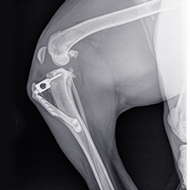The new syndrome has been termed feline audiogenic reflex seizures (FARS).
Tin foil, metal spoons and the crinkling of paper most common triggers
Elderly cats can suffer from seizures caused by certain high-pitched sounds, according to a study published in the Journal of Feline Medicine.
Neurologists at Davies Veterinary Specialists found that certain sounds induce 'absences' (non convulsive seizures), mycologic seizures (brief, shock-like jerks of a muscle or group of muscles), or generalised tonic-clonic seizures (where the cat loses consciousness and its body stiffens and jerks, often for several minutes).
The new syndrome has been termed feline audiogenic reflex seizures (FARS).
The study found that FARS occurs in pedigree and non-pedigree cats. With the average age of onset being 15 years, the study also indicated that FARS affects mostly elderly cats.
The most commonly reported triggers were the sound of crinkling tin foil, a metal spoon clanging in a ceramic feeding bowl, chinking or tapping of glass, and crinkling of paper or plastic bags.
Other less common triggers were the sound of digital alarms, velcro, running water, computer printers and firewood splitting.
Researchers say that avoiding the sounds could reduce the seizures. However, owners reported that it was sometimes difficult to avoid certain sounds.
Working with International Cat Care, the researchers compiled a questionnaire for owners to complete. They received hundreds of replies across the world from owners who had noted a problem in their cats in response to certain types of sound.
The owners said that their local vets had no information at all about it, and often did not believe that a sound had triggered the seizure.
Lead author of the study, Mark Lowrie, says: "We have been overwhelmed by the response to our work. A second study is soon to be published suggesting that levetiracetam is an excellent choice of medication in managing this condition. Our experience is that it can completely rid a cat of these sound-induced seizures, including the myoclonic twitches – one owner reported that levetiracetam had 'truly been a miracle drug for my cat.'"







 Birmingham Dogs Home has issued an urgent winter appeal as it faces more challenges over the Christmas period.
Birmingham Dogs Home has issued an urgent winter appeal as it faces more challenges over the Christmas period.
